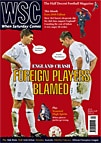 Promotion to the top flight should be cause for celebration. But what if a club are simply not prepared for the task ahead? David Squires remembers when Swindon conceded 100 goals in a Premier League season
Promotion to the top flight should be cause for celebration. But what if a club are simply not prepared for the task ahead? David Squires remembers when Swindon conceded 100 goals in a Premier League season
In 1993, Swindon Town reached the top flight of English football for the first time in their history. A dramatic 4‑3 victory in the play-off final against Leicester City led to scenes of wild jubilation, as supporters gleefully celebrated their team’s ascent to the Premier League – an uncharted land of squad numbers, fireworks and dancing girls.
However, lurking in the shadows of Wembley on that humid afternoon was the dastardly figure of Chelsea chairman Ken Bates. Just days later, Swindon’s player-manager, the pre-mad Glenn Hoddle, was unveiled as the new Chelsea boss. Hoddle’s assistant manager, the affable John Gorman, was perceived to have played a vital role in the team’s success and so the Swindon chairman, Ray Hardman, acted quickly (or panicked) and offered him the position of first-team manager.
Despite an unconvincing pre-season campaign and the loss of key players Colin Calderwood and Dave Mitchell, Swindon fans travelled to the opening fixture at Bramall Lane quietly confident that their team’s neat passing game would leave Sheffield United’s muscular goons blundering in their wake. Swindon lost 3-1. The humiliation of defeat was worsened by the fact that the Town players were forced to wear Sheffield United’s socks – evidently even the kit man was finding the step up tricky.
Undeterred, supporters reasoned that the team’s away form had been unimpressive during the promotion season and it was at home where the Robins would stamp their authority on the League. Four days later, Oldham scored in injury time to win 1-0 at the County Ground, a defeat swiftly followed by a televised 5-0 thrashing by Liverpool. The fortress was not as impregnable as anticipated. The next result technically marked an improvement – a 5-1 defeat at The Dell; Southampton barely broke sweat. The Robins lay at the foot of the table, wings broken under the cruel boots of teams who seemed to be, unfairly, better at football.
Gorman saw a pattern emerging. He dived into the transfer market and over the next few months wildly filled his shopping basket with players of all shapes and sizes, the only common denominator being their lack of ability. The creaking Terry Fenwick and Brian Kilcline were brought in to shore up the leaky defence (they didn’t), Lawrie Sanchez was recruited to add some steel to the midfield (he didn’t), and strikers Andy Mutch, Keith Scott and Frank McAvennie were added to provide some sorely needed firepower (they didn’t). Mutch, a great player in the league below, did at least provide a brief moment of joy with an equaliser in a 2-2 home draw with Newcastle United. He celebrated with an impressive somersault, footage of which was used on the opening credits to Grandstand for a year or so afterwards. Some might call that a legacy.
The first league win of the campaign didn’t come until the 16th match, with a 1‑0 victory against kindly QPR. Sadly, this failed to act as the springboard to an ascent up the table. Over the next few months Swindon lost 4-0 at home to Arsenal (younger readers should note that Arsenal haven’t always played like the Harlem Globetrotters, this team contained Eddie McGoldrick and David Hillier); 6-2 at Everton (who only stayed up on the last day thanks to an odd performance by Hans Segers); 5-0 at Aston Villa; and 7-1 at Newcastle (who were possibly enraged by watching Grandstand while eating their pre-match meal).
Peppered among this catalogue of misery was the rare positive to give false hope: the post-Christmas form of Jan Aage Fjortoft, who miraculously remembered how to score goals; a creditable 2-2 draw at Liverpool; a 1-1 draw at Arsenal (never mind the McGoldrick factor, this was Arsenal); four points off Spurs; and a dramatic 2-2 draw with champions Manchester United at the County Ground. Many will remember this match for Eric Cantona’s red card after his attempt to kill John Moncur with an enigmatic stamp to the heart. However, the image that sticks in my mind is of the crowd trouble outside the ground after the final whistle. Amid the scuffles I witnessed a moment of pure Chief Wiggum policing, when a dog handler released his snarling hound to restore order. The dog ran in an enormous circle, deftly avoiding the swinging fists and boots, before racing back to sink his teeth into the hand of the policeman who had released him.
At one point Swindon had clawed their way back to within two points of safety, but having won only one of their last 14 games, and only four matches in all, relegation was finally secured with a 4-2 defeat by Wimbledon, for whom John Fashanu scored a 25-yard chip – it was that kind of season. Cut adrift at the bottom of the league, the ultimate humiliation came with a 5-0 reverse at home to Leeds in the final match of the season. The last goal, scored in injury time by Chris Fairclough, was the 100th league goal Swindon had conceded that campaign. No team has come close to matching this miserable record since, but if Derby can coax Terry Fenwick out of retirement, they can probably give it a decent shot.
From WSC 251 January 2008